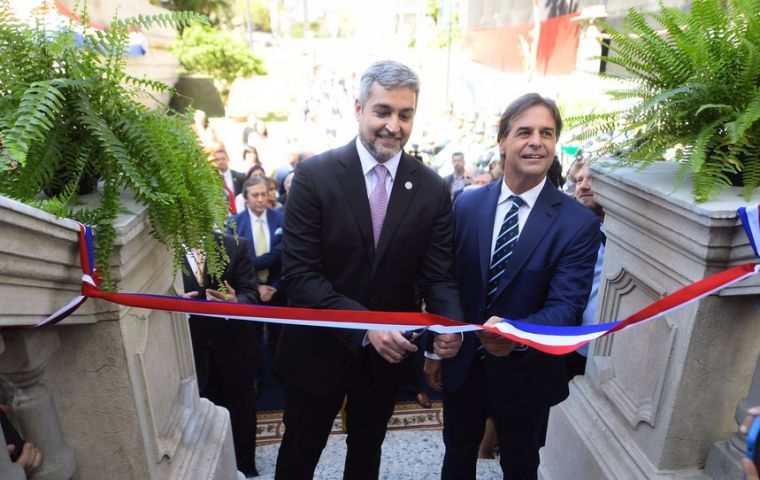MercoPress. South Atlantic News Agency
Historic Paraguayan embassy in Montevideo reopened
 The restoration of the old embassy renews the bond between Uruguayans and Paraguayans, Abdo said during the ceremony. Photo: Dante Fernández / FocoUy
The restoration of the old embassy renews the bond between Uruguayans and Paraguayans, Abdo said during the ceremony. Photo: Dante Fernández / FocoUy Paraguay's President Mario Abdo Benítez Friday met with his Uruguayan counterpart Luis Lacalle Pou during the reopening of the historic embassy in Montevideo after refurbishing work.
Both heads of state cut the ribbon marking the occasion at the Bulevar Artigas premises which had been abandoned for 11 years and have now been restored. The construction of the Embassy's headquarters dates back to 1928.
Abdo highlighted the historic relationship between the two countries and described as unacceptable the fact that the building had remained closed for 11 years. “Paraguay and Uruguay have a common history of solidarity. We have many signs of affection and appreciation from the Uruguayans, for example in the Chaco war. We have many common challenges. We are reopening the Embassy after 11 years,” Abdo said.
“From that past of solidarity that we share, we are committed to building a common destiny for both peoples,” he added.
“I would like to congratulate all those who made this work possible so that today we can be in our house, congratulating ourselves among Paraguayans and Uruguayans for this historic moment. For us it is very significant, it renews that historical bond that our peoples have,” he went on.
The refurbished headquarters has a gala hall covered with ñanduti looms inspired by the vision and management of First Lady Silvana Abdo regarding the protection and revaluation of cultural heritage, for which she created the School for the Safeguarding of Ancestral Handicraft Techniques. The making of the ñandutí loom was carried out by 30 craftswomen from Itauguá who were in charge of designing, weaving, and making 70 rectangular pieces with white, beige, and sand-colored threads, and then joining the panels with the necessary dimensions. The work was carried out at the Arapaho Weavers' Association.
In charge of the assembly and mounting of the art pieces were Aída Raquel Bareiro, a pedagogue and education professional, and Myriam Leite, both Paraguayan residents in Uruguay, who did it on a pro bono basis.




Top Comments
Disclaimer & comment rulesCommenting for this story is now closed.
If you have a Facebook account, become a fan and comment on our Facebook Page!